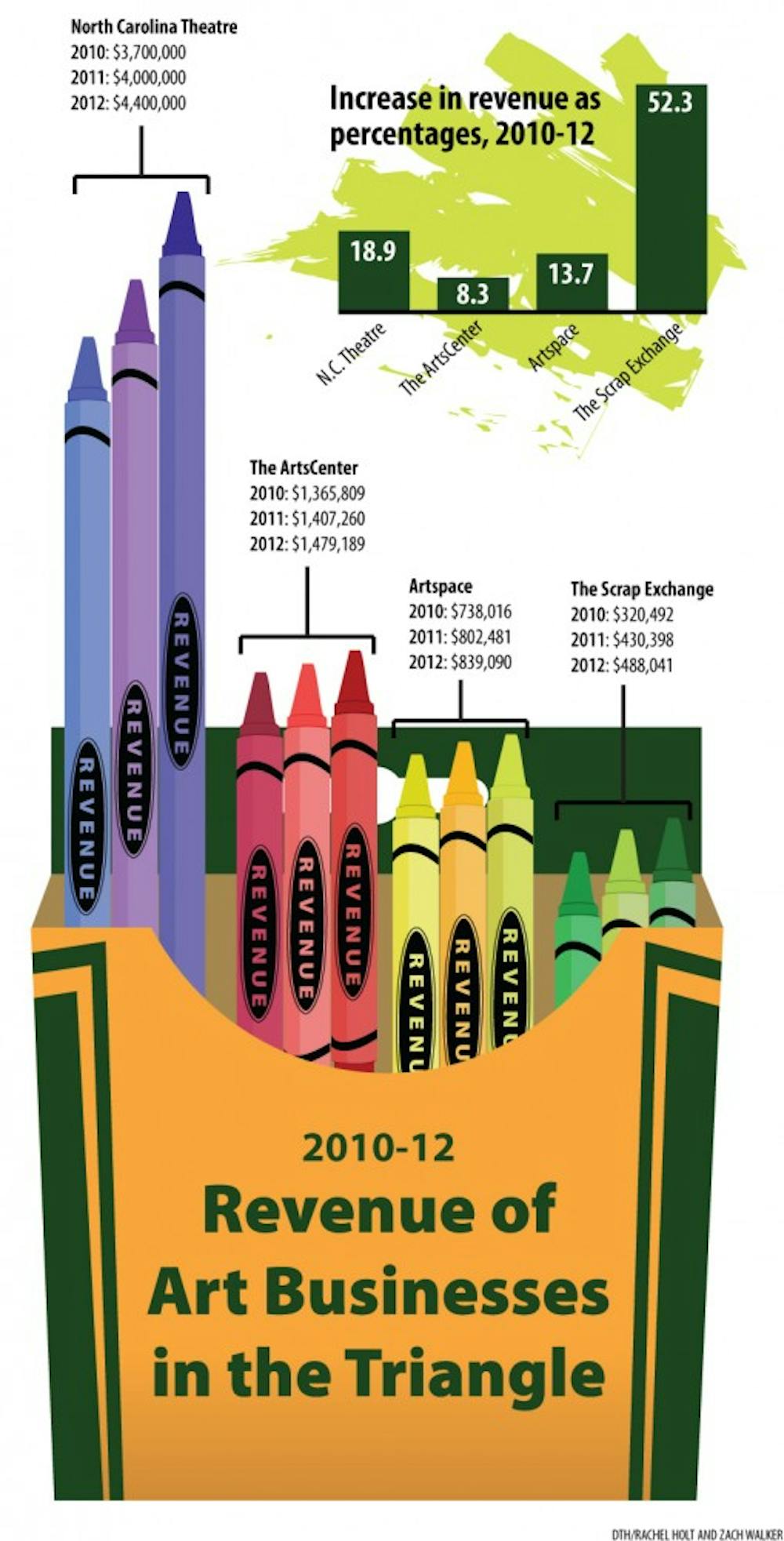Of those who graduated in 2012, only 21 students from studio art, art history, music, music performance and dramatic art majors completed the survey — 13 of those students had jobs, six went to graduate school and three were still looking for a job six months after graduation.
Swartz, who currently interns at the North Carolina Museum of Art in Raleigh, said that although a local career might be hard to come by, she still wants a job in the arts.
“I originally considered going to (Savannah College of Art and Design) and doing more of a design, studio-based program, but then I realized that was just too much,” she said.
“I figured arts appreciation would be a great place to start. I could still be in that world and be with like-minded people, but not have to go through all that,” she said.
Despite limited job opportunities in the arts world, arts businesses in the Chapel Hill and Carrboro areas report that they are doing well after the 2008 recession.
In the 2011 fiscal year, The ArtsCenter in Carrboro operated in the red with a net income loss of almost $53,000.
But for the center’s 2013 fiscal year, the nonprofit organization had a profit of almost $32,000 — in 2012, the center profited about $142,000.
Art Menius, executive director of the center, said he attributes the turnaround to large cutbacks in spending.
“As a nonprofit in the community, we do depend on the folks invested in The ArtsCenter to stay viable,” Menius said.
“The ArtsCenter right now runs at about 78 percent earned revenue from tuitions and camp registrations and concerts, and that is actually higher than is really healthy. We would be in a stronger financial position if we were more around 65 percent earned and 35 percent grants and donations.”
The median salary of full-time employees at The ArtsCenter is in the mid-$30,000s, Menius said.
He also said seven of the center’s 11 full-time employees attended Triangle-area universities, and three part-time employees are recent graduates of UNC.
To get the day's news and headlines in your inbox each morning, sign up for our email newsletters.
Torey Mishoe, manager of Chapel Hill’s FRANK Gallery, said she could not disclose the gallery’s finances.
But Mishoe said FRANK had about 11,800 visitors in 2012, and as of July 2013 there have been about 7,800 visitors to the gallery.
Mishoe said students don’t make up a large number of visitors — in fact, she said some gallery visitors will come whenever students are not in school because Franklin Street is less crowded.
Businesses in Durham and Raleigh have also seen an uptick in revenue in the past few years.
In 2012, The Scrap Exchange, a nonprofit reuse craft store in Durham, saw a revenue of a little more than $488,000 compared to about $430,400 in 2011 and almost $320,500 in 2010.
Rebecca Currie, the business’s finance manager, said The Scrap Exchange is more focused on earned income for its business model than other income sources, such as grants or corporate sponsorships.
She said she attributes the increase in revenue to the store’s decision to focus on hosting community events.
“We’re just trying to stay focused on the stuff that we do all the time, and try to make that better,” Currie said.
But spending for the nonprofit did go up in 2012. In 2011, the store saw a profit of about $36,120 while in 2012, there was only a profit of about $2,800. Financial records show the nonprofit spent about 66 percent of its income on employee salaries and health benefits.
The business also pays all of its employees, both full-time and part-time, hourly.
Artspace, a nonprofit art studio in Raleigh that has several galleries and spaces for local artists to rent, only has seven full-time employees, with two from Triangle-area universities.
Mary Poole, the studio’s executive director, said the organization has always been running a tight ship.
Artspace runs mostly on money from corporate sponsors and grants, and in 2012 they had a total of $839,000 in revenue.
Poole would not disclose salary information.
She also said economic challenges in the community have produced some struggles for the group, and they’ve had to work even harder to get more corporate sponsorships and grants.
“It definitely seems to be getting better,” Poole said.
“We just had to really closely examine our expenses and cut programs where we can and make sure we’re being as efficient as possible.”
Lisa Barrie, president and CEO of Raleigh’s North Carolina Theatre, said after the theater worked to be more patron-focused and added a touring company it has become more profitable.
“Like any company that is responding to changes in patron behavior and the big backdrop of the economic meltdown in 2008, we all had to think a little bit more creatively and innovatively about how we do business,” Barrie said.
“We’re no different from any other company that’s trying to deliver on our mission.”
N.C. Theatre saw a revenue of $4.4 million in 2012, $4 million in 2011, and $3.7 million in 2010. Barrie would not disclose salary information.
The theater only has 14 full-time employees, but Barrie said a lot of opportunities were available to college students through their unpaid internship program.
She said networking was key to landing a job in the arts world, especially in the Triangle.
“You’re not going to find a wealth of job opportunities in the arts world — they’re few and far between,” Barrie said.
arts@dailytarheel.com




